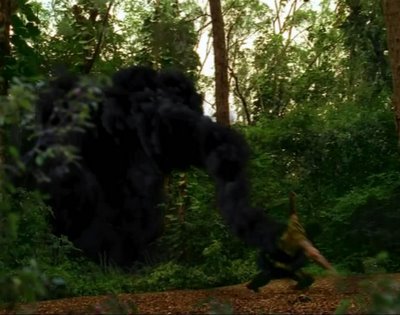 “The Cost of Living,” last week’s Lost episode, has raised a flurry of talk online among television critics and fans. Why? I waited over a week to post, so this shouldn’t be a spoiler to y’all: if you haven’t heard by now, our beloved thug-turned-priest Mr. Eko was killed by the black smoke thingy (which, interestingly, many think is actually only one form in a shape-shifting repertoire of a single entity that’s haunting the islanders).
“The Cost of Living,” last week’s Lost episode, has raised a flurry of talk online among television critics and fans. Why? I waited over a week to post, so this shouldn’t be a spoiler to y’all: if you haven’t heard by now, our beloved thug-turned-priest Mr. Eko was killed by the black smoke thingy (which, interestingly, many think is actually only one form in a shape-shifting repertoire of a single entity that’s haunting the islanders).Now, Eko isn’t the first of the main crash-survivor characters on Lost to die (in fact, he’s the fifth). Up until now, I’ve been, well, pretty darn impressed by the chutzpa as well as the creativity of the writers in every case. But Eko’s death has me heaving a heavy sigh. (Read the episode synopsis here.) Now, I admit Eko was one of my favorite characters (if not the favorite), a big reason being his presence deepened and advanced the spiritual and faith themes in the series. But somehow his death doesn’t quite sit right—and I’m not the only one who thinks so
Since the episode aired, a variety of reasons have surfaced offering possible explanations outside the storyline itself as to why Eko left us so abruptly for the great beyond. Whether it’s rumors that actor Adewale Akinnuoye-Agbaje was disruptive on the set or that he actually asked to be let out of his contract for personal reasons related to his parents’ deaths or other film projects he was working on, fans and critics are not taking this death so easily—for reasons as various as it makes the show “less colorful” to objections related to the writers’ creative (or should we say, lack of creative) choices.
 For me, the issues center around the lack of continuity when it comes to how death and its relationship to redemption and repentance have been explored and portrayed on Lost. This relationship is a hot topic online and among fans and critics of the show (see here for example). For the previous characters, their deaths seem related to rebirth or redemption, a coming to terms with their pasts and being ready to move forward—Shannon and Ana Lucia being two prime examples. Boone comes to terms with his troubled past before dying (and his death poignantly coincides with the birth of Claire’s baby). While we don’t get any coming-to-terms-with-the-past with Libby, she pointedly dies after saving Hurley from jumping off a cliff.
For me, the issues center around the lack of continuity when it comes to how death and its relationship to redemption and repentance have been explored and portrayed on Lost. This relationship is a hot topic online and among fans and critics of the show (see here for example). For the previous characters, their deaths seem related to rebirth or redemption, a coming to terms with their pasts and being ready to move forward—Shannon and Ana Lucia being two prime examples. Boone comes to terms with his troubled past before dying (and his death poignantly coincides with the birth of Claire’s baby). While we don’t get any coming-to-terms-with-the-past with Libby, she pointedly dies after saving Hurley from jumping off a cliff. What about Eko? He’s a mixed bag. Some think his declaration to a form that appeared to be his dead brother (who was most likely the smoke-monster) that the violence in his past was only making the best of a bad situation (i.e., “I played the hand I was dealt the best I could”) was a pseudo-redemptive moment; others think perhaps his death was a judgment of his past life (one full of violence that began heart-wrenchingly with a violent act to save his brother in African village as a child). But neither explanation, at least in my opinion, quite fits.
What about Eko? He’s a mixed bag. Some think his declaration to a form that appeared to be his dead brother (who was most likely the smoke-monster) that the violence in his past was only making the best of a bad situation (i.e., “I played the hand I was dealt the best I could”) was a pseudo-redemptive moment; others think perhaps his death was a judgment of his past life (one full of violence that began heart-wrenchingly with a violent act to save his brother in African village as a child). But neither explanation, at least in my opinion, quite fits.Granted, Eko is the first of the main characters to be directly killed by “the Island” or an inhabitant of it. The other four were either killed accidentally (Boone) or shot to death by another crash survivor (Shannon, Ana Lucia, and Libby). So perhaps the writers are starting a new thread? However, if that’s the case, the context or set-up for this type of shift wasn’t laid out or crafted very well.
So, I’m pretty much throwing my hat in with the fans and critics who found Eko’s death forced. Sadly, it made much more sense when I read reports in the days after the episode aired that he asked to be released from his contract. Like other critics in this ring, I’m disappointed that the writers couldn’t have handled it better. I wish they’d been more creative and given this incredibly rich, haunting and deep character a death at which we could have raged but at the same time respected.
My .02 worth anyway.
(Images: copyrighted by ABC) lostctgy